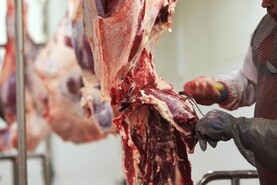According to Tasty Careers, food manufacture accounts for 43,400 jobs in Scotland and a prospective 11,000 more before 2022, which comes as a nugget of promise to employees hoping to forge a career in the red meat processing sector.
Executive manager of the Scottish Association of Meat Wholesalers Ian Anderson explains that a career in the red meat processing industry in Scotland can be paved a number of different ways.
“There is a wide range of career opportunities in the red meat processing sector to suit employees of different skills and abilities,” says Ian.
“In the larger companies, you find a variety of professional and skilled jobs at graduate or certificate level, similar to other sectors,” he continues.
The beef-processing sector opens up a world of opportunity in terms of prospective jobs and there is a particular demand for accountants, engineers, HR specialists and IT experts.
In order for a business to succeed as a whole, it takes a collective effort. “Sales people and marketers are also important employees in meat companies,” says Anderson.
“Within the processing sphere, there are a variety of opportunities and, of course, logistics, packing and dispatch positions are crucial to ensuring that products reach their retail and wholesale destinations,” he continues.
In terms of graduate opportunities, Anderson says: “Within big companies, there are a number of graduate training schemes.”
These training schemes offer positive career advancements for post-graduates who hope to develop and diversify their skills and bridge the gap between academic studies and the working world.
Dawn Meats & Highland Meats
Dawn Meats supplies premium beef and lamb products to over 40 countries worldwide and has done for over 30 years.
Dawn Meats is looking for graduates who have the potential to succeed in a fast-paced, dynamic business environment, in the hope of developing the skills necessary to become future managers.
Highland Meats, which is a division of Dawn Meats UK, produces PGI Scotch Beef and Caledonia Crown-branded Aberdeen Angus. Highland Meats prides itself on the business’s positive working environment and welcomes prospective employees with open arms.
HR director of Dawn Meats Group Helen Rees says: “At Highland Meats, graduates will have the opportunity to work across a multitude of disciplines in a close-knit and friendly community.
Producing world-renowned PGI Scotch Beef and Caledonia Crown-branded Aberdeen Angus, Highland Meats offers unique access to the procurement and marketing of these brands.” Graduates can expect quality training with hands-on involvement across key areas of the business itself.
Recruitment at Dawn Meats is ongoing and CVs should be submitted to hr@dawnmeats.com. More information about job opportunities can be found on the careers section of their website.
Modern apprentice meat and poultry skills courses
In terms of hands-on work at the heart of meat production, Scottish Meat Training offers government-backed modern apprenticeships.
Training co-ordinator for Scottish Meat Training Claire Simpson says: “Work-based training frameworks are specifically tailored to meet the skills needs of employers in Scotland. There is currently a very healthy job-market in the meat industry and, at any one time, we have over 200 trainees on our programmes.”
The apprenticeship qualifications are designed to be a true reflection of the day-to-day job requirements and include experience in areas such as butchery, meat-processing, distribution, food manufacturing excellence and counter assistance.
“We have employers who are actively recruiting for the right personnel,” says Claire.
“We are happy to employ new trainees who have no previous experience and give them the training required to be a valuable member of the team.”
There are a number of different levels within a Modern Apprenticeship. A level two modern apprenticeship can take up to two years to complete, depending on the experience of the candidate, and is comprised of Scottish Credit and Qualifications Framework (SCQF) 5 Scottish vocational qualification (SVQ), five core skills, hygiene certification and one other skills unit.
A level three qualification would take up to a further two years and comprises of a SCQF 6 SVQ, five core skills and two additional skills units.
There are also a number of short courses within Scottish Meat Training. These include level two food safety, level two HACCP and meat managers hygiene and HACCP (level three) throughout the year, and these are always well attended.






 This is a subscriber-only article
This is a subscriber-only article











SHARING OPTIONS: